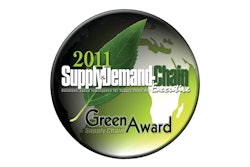
When it comes to environmental issues, the European Union is racing well ahead of the pack. And spewing less pollution into the atmosphere while doing so.
The European community is no Johann-come-lately to Green, either. Its first policy was launched in 1972. They’ve tackled acid rain, the ozone layer, air quality, water pollution and more.
Of great importance to Supply Chain, member states, in 2007, agreed that the EU is to use 20 percent renewable energy in the future and that it must reduce carbon dioxide emissions by at least 20 percent in 2020, compared to 1990 levels.
This includes the ambitous goal that by 2020—a mere nine years from now—10 percent of the overall fuel quantity used by cars and trucks in EU 27 should be running on renewable energy such as biofuels.
Two of the companies we’re honoring in Supply & Demand Chain Executive’s 2011 Green Supply Chain Awards (see page 16) are based in Europe—Essen, Germany’s DB Schenker and Paris, France’s EcoVadis (Supply Chain enabler).
EcoVadis focuses on what it calls Sustainable Supply Management and Sustainable Procurement, which brings together the principles of supply management and corporate social responsibility to make suppliers a sustainable source of value, anticipating environmental issues rather than reacting to them, and improving the labor standards throughout the supply chain.
The company operates a global platform for supplier sustainability ratings, leveraging a cloud solution and Corporate Social Responsibility (CSR)scorecard. The scorecard covers more than 150 purchasing categories in 90 countries and with 21 environmental, social and ethical criteria.
DB Schenker focused on environmental and ecological issues in the global transport arena. It formed an “Eco Excellance Team that organizes and offers regular environmental training course for all staff.
For example, all 20,000 of its truck drivers in Europe are trained in fuel-saving driving, as are 4,500 train drivers. In addition, the company conducts energy audits in its logistics centers to assess the use of energy-saving light bulbs and motion sensors.
We all know that more efficient transportation—whether train, truck, ship or air—can consume less energy and therefore produce fewer harmful emissions. Schenker has instituted its CO2 policies thorughout its entire intermodal network.
It’s admirable. As is the work of all 39 of the companies we’re honoring with our 2011 Green Supply Chain Awards.
They are showing that the bottom line and corporate responsibility are not mutually exclusive. It can be done. As you read about what these companies have done, I hope it inspires you to think about what your company is doing for the environment.
Can you do more? Give it some thought. Meanwhile, enjoy the issue.

















